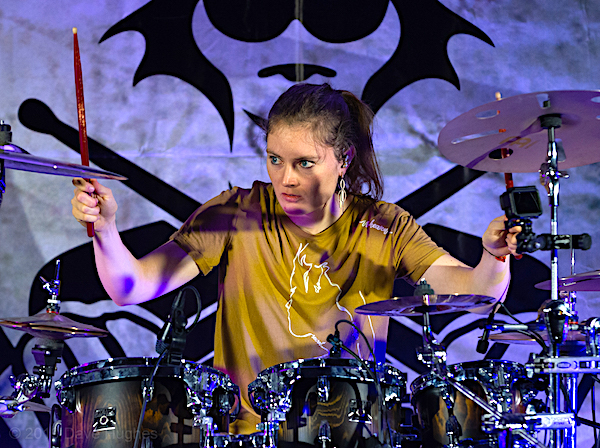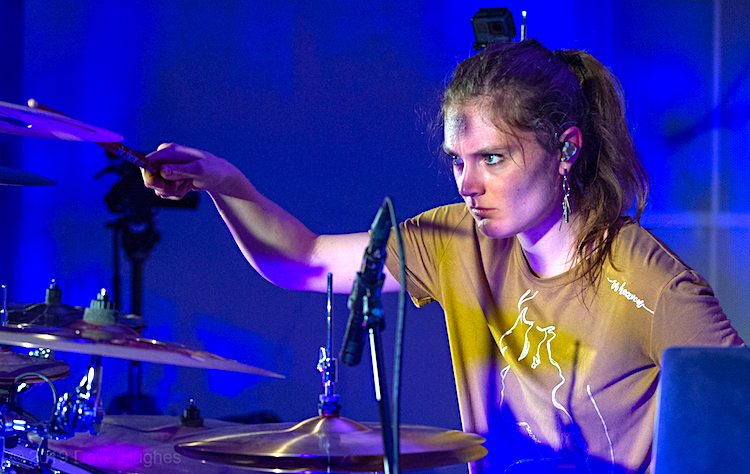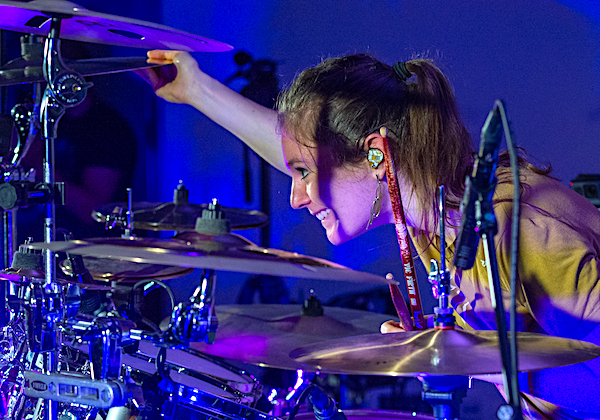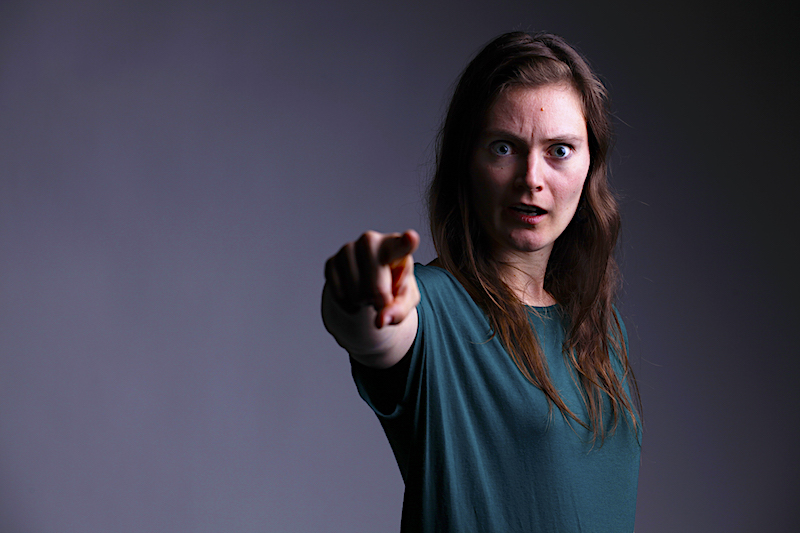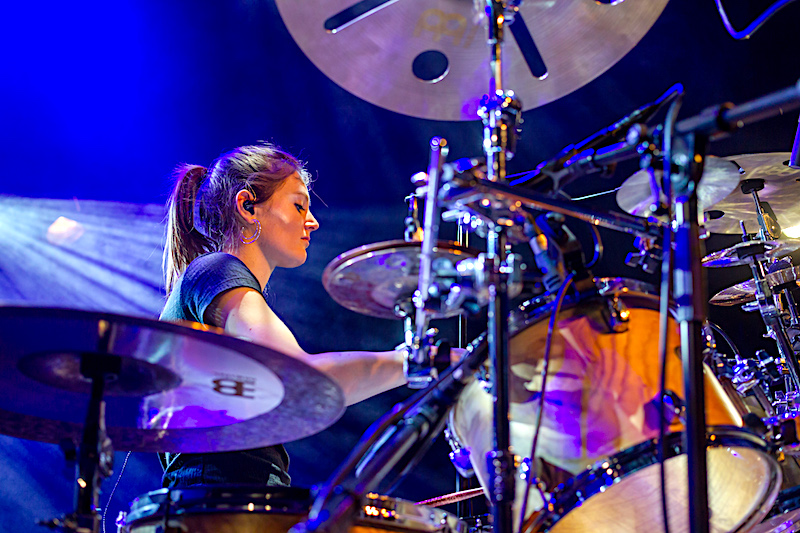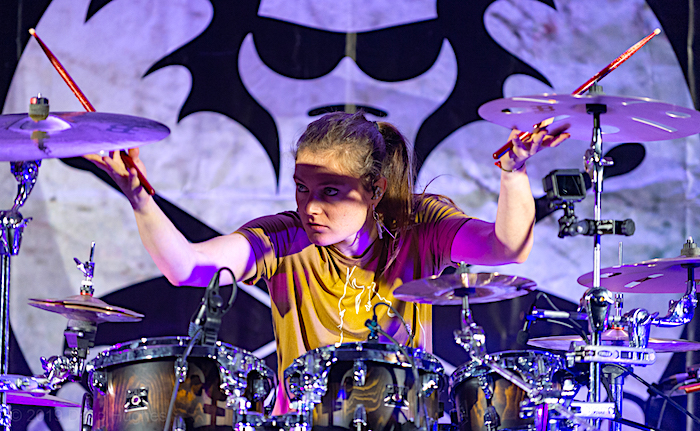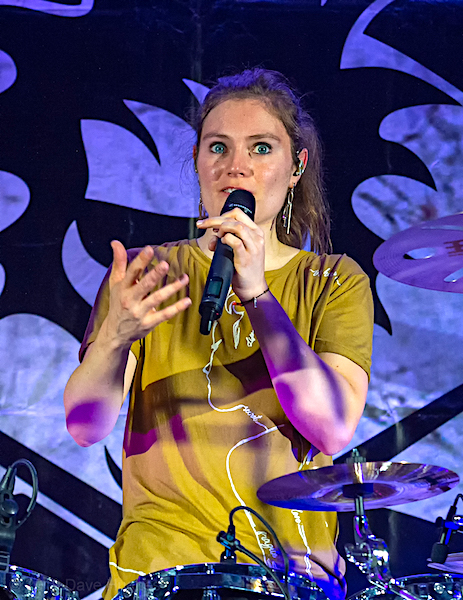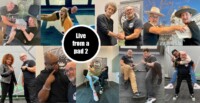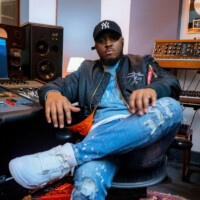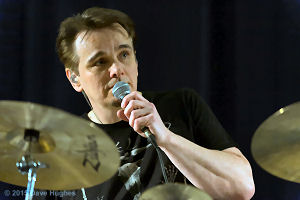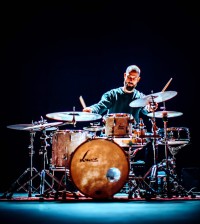Odd time signatures, polyrhythms and groove illusions are a whole crazy world within music, and due to the independence and patience required, most of us will only ever scratch the surface.
Camille Bigeault found her passion in exactly this topic and sharing her ideas online not only earned her thousands of followers, but also secured her the respect of the international drum community and made her an in-demand clinician far beyond the borders of her home country of France.
As a contrast to complex 4-way coordination, Camille is the touring drummer for French rock/pop artist Jenifer, which is a gig that draws upon her rock solid and hard hitting grooves.
I sat down with Camille after her performance at the UK drum show in Manchester to talk about her musical upbringing, her online fame and writing her own music.
Your parents are musicians?
Yes they are. My mother worked as a percussionist for 30 years but she’s not really a drummer at all, meaning she never used her feet. She mainly played Salsa music, so timbales, congas and stuff like that, and worked with two very famous French Pop artists called Jean-Pierre Mader and Michel Fugain.
My father is a singer, guitarist and flutist and used to do solo shows for kids.
They both don’t work in music anymore though. My mum was tired of it and now works in well-being, and my dad started working as a cameraman and film maker making documentaries.
But yes, it meant I grew up around music and I think that really helped me training my ears and gave me the ability to listening to something and just play it without having to read music.
So was there mainly Latin music around the house?
Not only Latin, no. I used to listen to music a lot when I went to bed and my mother would just give me a lot of cassettes with all kind of music: pop variety, jazz/fusion, some progressive things and a lot of jazz. I also grew up listening to a lot of national radio but I really prefer English songs. There was Latin as well though so it’s maybe easier for me now to study clave than for people who are not used to it at all.
Despite your parents being musicians you actually didn’t start playing the drums till you were 12 years old.
Yes, I grew up with music but I didn’t have the will to touch any instruments. It just didn’t occur to me. When I was 12 my music teacher at school had a drum kit in class and made us try it out. We all had to pick an instrument for playing a song at a school assembly, I got the drum kit and really enjoyed it. That was the thing that really introduced me to drums. I started playing some of my mums set ups at home but I was trying to imitate a drum kit and it just didn’t quite work. After one year she took pity on me and bought me a real drum kit. I started teaching myself by playing along to rock and pop music like Blur, the Beatles, Placebo, Coldplay, Muse and that sort of stuff.
The thing that really made me want to become a drummer for a living was watching a DVD of Placebo called ‘Soulmates Never Die’. It was so powerful with all the songs, the sound, the lighting… and the drummer was just so into it. That really inspired me and I decided that’s what I wanted to do.
Did you keep on teaching yourself or did you get drum lessons?
I taught myself for two or three more years after that and then started having lessons at a local music school. I did that for two years but then was encouraged to go to the conservatoire in Toulouse which is the only one in France that actually has a drums class rather than a percussion class. You study a good amount of different styles like Fusion, jazz and pop and topics like technique, odd time signatures, groove illusions and double pedal. We had an amazing teacher called Nico Fillatreau who always knew what to say to link what he just thought you with improving your playing; and he is an amazing drummer.
You’re also writing songs as a singer songwriter.
Yes, I had a good period, between the ages of 15 and 21, where I wrote songs just with guitar and vocals. I also wrote my own piano and bass on top of it with Garage Band or Logic. I mainly wrote pop songs like that.
Now I’m doing the same thing but without the singing and focusing on the drums. Maybe I will sing on it at some point but for now it’s all about creating songs based on some interesting drums parts I want to point out.
You studied jazz at university. Is jazz a passion at the moment?
No. [laughs]
Parallel to being at the conservatoire I studied jazz at the University in Toulouse but it’s not really a passion of mine. It’s been very interesting to learn jazz harmonies and arrangements though.
You then went to L.A. to check out the session scene over there.
Yes, I wanted to make connections over there because I’m not too fond of French music. I just think the French language isn’t very musical. I was always drawn towards American or English music so I thought I should make some connections in L.A. in case I want to live and work there in the future.
I met some really cool people and ended up doing some things with Drumchannel, which was my first time with cameras and all that – very scary. Now I’m more thinking about doing my stuff where I am and if an artist wants to work with me I can move where the job needs me. At the moment though I’ve got work in Paris and I’m happy with that.
Generally I’m not too comfortable in Paris because it’s very polluted and feels very crowded but it’s great for work and to go to jam sessions. It’s tiring though. I would rather just do my work and then have a place to relax, enjoy the nature and spend time with your family and friends.
You’ve made a name for yourself through Youtube. Was that the plan or did it all just happened by accident?
Not that much on Youtube actually but Instagram and mainly Facebook. It all totally just happened. In 2016 I made a first video about polyrhythms. It was just an idea I had in the studio and I wanted to share it with people. I never thought that it would be seen by many people but it just spread like that. After that people started to offer me gigs and endorsements; and I actually got my first big gig playing 86 shows for the Rock Opera ‘Le Rouge And Le Noir’ in Paris.
When something like that happens from just one video you of course want to do it again and grow your fanbase, so I kept doing videos.
As I said, it all mainly happened on Facebook but two years ago I also started an Instagram account because I feel there is a different audience on the two platforms and you have to nourish both sides. That was very helpful in starting my career.
And it was polyrhythms that you focused on most?
Yes, that was the thing that started me getting noticed. I really love the topic and the fact that people were interested in it actually made me want to explore it more deeply too. Even if there are a lot of drummers before me who are exploring this topic, I’m not very aware of them. I don’t really look for their explorations or watch their videos to steal ideas. I have a lot of my own ideas and try to practice and discover more things.
I’m not completely sure why interested in it that much though. I think it’s because the possibilities are limitless. The rhythmic song that happens when you just cross two rhythmic patterns which don’t have the same rhythmic signatures or groupings can be very interesting. That’s something I really want to explore.
What sparked the initial interest in this topic?
I first got interested in it when we studied a book called ‘Rhythmic Illusions’ by Gavin Harrison at the Conservatoire. It’s a great book to get started because it introduces you to playing odd time signature rhythms with only one limb so you can get used to what it sounds like. For example playing a ‘standard’ drum groove but then having one hand play in seven on top of it. That’s what introduced me to rhythmic illusions.
When you now write music do you approach it with rhythmic solutions in mind?
Yes, that’s the base of my composition: how can I trick the audience with what they think they’re hearing and then adding another element to twist it around and mix it all up. I like the kind of tricking where people wonder: “Wow, where is the 1?”. It’s actually quite tricky and fascinating to write music where you have several rhythmic patterns with different groupings. I would maybe compose a guitar part in seven to fit my ride pattern but a synth in four to match my foot ostinato. I try to use all kinds of ideas from odd time signatures, polyrhythms and rhythmic illusions.
Is it easy for you to switch back to a “normal” pop gig?
Yes absolutely, that’s a completely different world. I now play for Jenifer and that’s a whole different energy and I’m asked to hit really hard and efficiently. Her album is quite soft electronic pop music but the live show is actually very rocky and I tried to stick to acoustic drums as much as possible. I didn’t want to play too many sounds on the SPDS because it’s not organic for me and I like having the sound come directly from the element to me.
On stage with Jenifer we have to focus on the power, the performance and on sharing the experience with other musicians on stage. The clinics are very different because I’m on stage by myself. I’m very lucky though because with Jenifer we have an amazing team, we all get along very well and we have so much fun on stage that I don’t miss the odd time signatures at all. The two things are just so different to each other. You either eat meat or you eat fish. If I would play fills that don’t fit with the music, I would get kicked out of the band.
You have been playing with Jenifer for quite a while now. How did the gig come about?
It’s been about a year now. We’ve been touring since March but we had a lot of promotional gigs and TV shows before that.
They were looking for an all girl band but didn’t know too many female musicians so they held an audition. A friend of mine (she was the bass player in the show I played in Paris), asked me if I would be free for the audition because they were a drummer short. She put my name forward two days before the audition and that was it.
A big part of your musical career has been playing with a Genesis cover band. Do you still have time for that?
No. I would really like to still play with them but when I moved to Paris we got a new guitarist and they needed to find a drummer to be there for rehearsals with him. I couldn’t really go all the way back there so often just for rehearsals. We agreed that the new drummer would play the gigs in the South of France, and I play the ones in the North. Since then there haven’t been any gigs in the North though, so it feels like I’m not part of the band anymore. It was a very good time though. I loved playing Genesis and learn all the Phil Collins and Chester Thompson parts.
So aside from touring you’re mainly doing masterclasses?
Not as many I would like too but it’s picking up. I recently had a drum camp in Holland, I’m here doing the UK drum show, I have three masterclasses coming up in the south of France and one in Paris. I would like to do more though. We are touring but the schedule is made in a way to allow us to still practice our instruments and focus on other projects. In general it’s between one and three gigs a week – sometimes more, sometimes less, so there is time for other things.
You were also the first French artist to film a Drumeo lesson.
Yes, it was about one year ago. I would like to do another one but I’m waiting to have my compositions ready before going out again. That was an amazing experience and I learned so much from it. I also had a few more fans and followers from it which is cool. I like sharing ideas and hopefully it will inspire more people.
You just mentioned ‘finishing your compositions’. Are you planning on releasing an album soon?
Eventually, if I have enough compositions, yes. For now I want to focus on one composition at a time and make it as cool possible in the studio with real musicians. At first I wanted to do it all by myself with MIDI instruments so I wouldn’t have to ask any musicians and save money but it’s very hard. It’s a lot of work to find the right sounds and of course it would all be more organic with real instruments. I also don’t want to just make music for drummers but songs that express my feelings and people can actually listen to. I want to find the right balance.
Finally, what’s next?
We finish our tour with Jenifer on the 15th of December, so I’ll have more time in 2020 to focus on my compositions and drums clinics. Among some clinics planned next year, we are sharing a stage with Anika Nilles, on February 26th in Bordeaux and on the 27th in Toulouse. I also have a little tour with another French artist, who more known as a Youtuber, PV NOVA, early 2020.
Thanks a lot for your time Camille!
Interview by Tobias Miorin
December 2019


